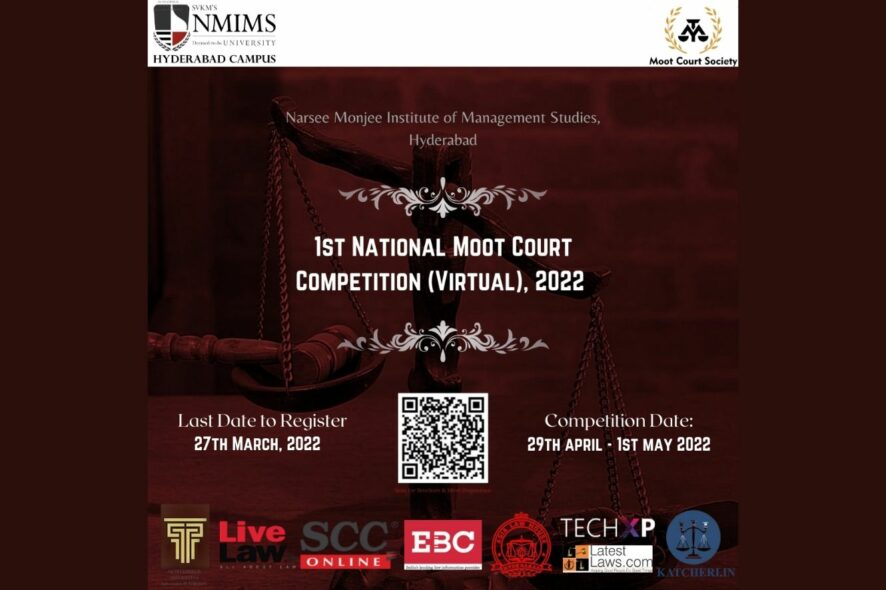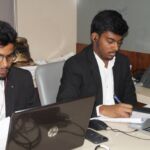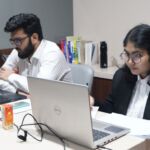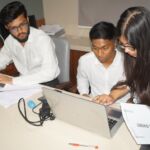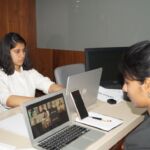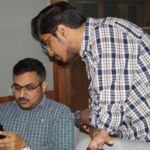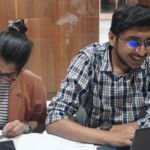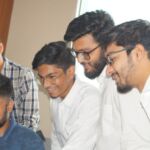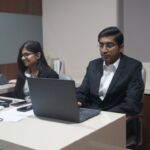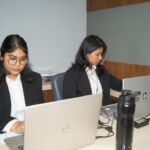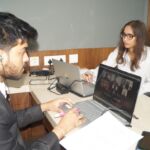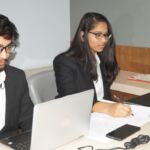NMIMS Hyderabad is pleased to host its 1st National Moot Court Competition (Virtual), 2022. The Competition is scheduled to take place from 29th April- 1st May 2022 through the Zoom platform.
The School of Law at NMIMS Hyderabad is under the umbrella of SVKM’s NMIMS (Deemed to be University) Mumbai and is considered one of the top Integrated Law plus Business Management programs in the country.
The 3-day Mega event aimed at Honing and Harnessing the Legal Debate of Law students and witnessed the participation of numerous teams from many law schools across the country. This edition of the Competition intends to test the mettle of the participating teams on various aspects of the Constitutional law.
The goal of this Moot Court Competition is to train students and provide participants an opportunity to various institutions imparting legal education to compete as well as hone their skill of arguing the case in the Moot Court Competition which is the hallmark of the Rule of law and the source of Justice.
The following teams registered and will be competing for the Winners Position:
- DY Patil University School of Law
- Saveetha School of Law
- SVKM’s Jitendra Chauhan College of Law
- Christ (Deemed to be university), Bangalore Central Campus
- Amity University, Kolkata
- Jamia Millia Islamia
- O.P.Jindal Global University
- Haldia Law College
- Sri Balaji Society’s Balaji Law College, Pune
- ICFAI UNIVERSITY, RANCHI
- Symbiosis Law School, Nagpur
- Vivekananda Institute of Professional Studies (VIPS), Delhi
- VIT AP UNIVERSITY
- ICFAI University Jaipur
- Government Law College, Mumbai
- MCE Society’s AKK New Law Academy
- Maharashtra National Law University Nagpur
- University of Petroleum and Energy Studies
- United World School of Law, Karnavati University
- Campus Law Central Faculty of Law, University of Delhi
Day 1
29th April 2022
Inaugural Ceremony
10:30 AM – The Guests, Participants, Audience have arrived, the stage is set for the commencement of the Inaugural Ceremony.
10:32 AM – The Convenor and Co-Convenor of Moot Court Society, Mr. Sankalp Agrawal and Ms. Navya Gupta start off the ceremony by welcoming the various dignitaries, Chief guest, faculties, participants and audience.
10:40 AM – The inauguration ceremony has been commenced. The Associate Dean, Prof. (Dr.) Silla Ramsundar addressed the gathering. Sir spoke about the recent achievements of the School of Law in the field of Moot Court Competitions and various events being organised by the University.
10:45 AM – The Faculty Co-ordinator for the Moot Court Society at NMIMS Hyderabad, Prof. Sridip S Nambiar welcomed the participants to the 1st edition of the Narsee Monjee Hyderabad SOL Moot Court competition. He emphasised on mooting is an integral part of a law students life. He adds Moot Court Competitions as highly competitive exercise where all law schools enthusiastically engage with each other to test their argumentation and persuasion skills. He thanked Dr. U. Varadharajan, who drafted the current edition of the Moot Proposition. He concluded his address with a classic Voltaire – “I disagree with you but I will defend till death your right to disagree“.
10:50 AM- The Chief Guest for the ceremony, Sri K.T.S Tulsi, Senior Advocate at Supreme Court takes the stage for his address. Sir chooses to address the students by tracing the condition of Moot Courts in his very own time. By stating his journey in the field of Moot he shared some memorable instances. Sir furthermore mentions his Moot Competition by stating his voyage to win the moot competition and getting the complement from the Chief Justice who was judging the competition”You are better than 90 per cent of lawyers of my court”. Mr Tulsi moreover mentions the role of the Moot Court in court practices. He further complements NMIMS, School of Law, Hyderabad to implement the course of Moot Court in the very initial stage.
He adds “Who is fond of Moot Court becomes the star in this field from the very first day“. He additionally emphasised participation and gaining experience and not solely winning. He wishes all the participants the best of luck.
11:00 AM – The Director of the NMIMS Hyderabad Campus, Dr. Tapan K Panda addressed the gathering by introducing the NMIMS University. He wished all the participants success for the competition.
11:05 AM – The Co-Convenor of the Moot Court Society, Ms Navya Gupta conveys a formal vote of thanks by mentioning all the dignitaries to joining the session despite their busy schedule and further congratulates the organiser and wishes the best of luck to all the participants.
11:08 AM – The inaugural ceremony has been concluded.
Prelim Round I
(12 PM – 2 PM)
12:00 PM – 9 Courtrooms have been set up, ready for anticipating participants to enter their respective courtrooms.
12:10 PM – The judges for the Preliminary Rounds have been briefed officially. A comprehensive bench memorial and a condensed version of the memorial prepared by the Moot Court Society were presented to the Judges.
12:15 PM – The Preliminary Round 1 has taken off in full swing in all the nine courtrooms and the teams are presenting their arguments with the prior permission of the court master subject to the authority of 2 judge bench.
12:17 PM Counsels in each courtroom have started with their arguments.
Courtroom 1 (NMTC 038 v NMTC 011)
The Chief Court Master Ms Sini Sunny commenced the session with the introduction of the judges, Mr. Chitwandeep Kaur and Ms. Rhea Luthra. The petitioner argued against the respondent’s rehabilitation and maintenance of the petitioner for the setup of the KSI Industry. The petitioner questioned respondent under article 32 and the respondent argued that it is for the betterment and development of the petitioner, to which the bench said that the petitioner cannot claim it under article 32 as it is against the state not a private body.
Courtroom 2 (NMTC 023 v NMTC 019)
The petitioner argued against the pollution caused by Kasablanca International and its effect on the state of chernaud. They further questioned the company’s action under Article 32. They tried argued why is this related to Article 32 and how all the necessary elements for article 32 are connected to the current proposition. Also they mentioned that respondent has no Question against the Issue No. 3.
Courtroom 3 (NMTC 036 v NMTC 044)
The petitioner who were up against the team NMTC 044, the respondent. Petitioner pleaded that KSI should not have absolute right over natural resources and hence will be liable to compensate for the exploitation. Petitioner also agrued on the basis of DPSP to which the judge asked about the enforceability of the article. While referring to many cases like MC Mehta v. Kamal nath, petitioners argued their points.
The respondent, while arguing, agrued on non maintainability of the petition in the court of law. Respondent also stated that government has followed due process of law. Denying petitioners argument that right to livelihood is infringed, respondent argued that they provided petitioners with job opportunities. Test of instrumentality was also discussed from the side of respondent. Respondent also showed that KSI complied with the environment protection rule and fulfilled all its social responsibilities and hence argued for dismissal of the writ petition.
Courtroom 4 (NMTC 013 v NMTC 021)
The petitioner argued against the state of chernaud for not fulfilling its obligations under the land rehabilitation and resettlement schemes and held the state of chernaud accountable for the injustice caused to the YULU tribe. They claimed the damages for 1 million rupees.
Courtroom 5 (NMTC 017 v NMTC 046)
The petitioner who were up against NMTC 046 who were the respondents. They argued against the maintainability. Petitioner counsel was asked questions as to why won’t the high court decision be considered valid and binding as in par with the supreme court decision. This lead to the counsel accepting withdrawal of the petition. The proceedings moved on and petitioners argument for the maintainability was struck down by the bench stating that as water is a fundamental right, this case is applicable under fundamental right violation.
Courtroom 6 (NMTC 015)
The round commenced ex-parte. The petitioner argued against the pollution and exploitation of natural resources. They were questioned on the basis of maintainability under Article 32. They also discussed cases like Subhash Kumar vs state of Bihar. There was an interesting discussion around M C Mehta case.
Courtroom 7 (NMTC 029 v 033)
The petitioners were questioned about the maintainability as they directly approached the supreme court instead of the high court. The petitioners were questioned the situation of the tribals and how the rehabilitation act was violated . The petitioners mentioned various facts about the lack of facilities for these tribes .Your lordship had questioned the respondents on how article 21 plays an important role . The petitioners were asked on how right to seek water is an essential fundamental right in regards to the case.
Courtroom 8 (NMTC 027 v NMTC 035)
The petitioner alleged that the respondent’s rehabilitation and maintenance of the petitioner for the establishment of the KSI Industry was unlawful. The petitioner questioned the respondent under article 32, and the respondent responded that it is for the petitioner’s benefit and growth. The petitioner prayed the court to halt the operation and pay the compensation.
Courtroom 9 (NMTC 042 v NMTC 025)
The petitioner argued that KSI should not have unlimited control over natural resources and should be held accountable for any exploitation. The judges inquired regarding the enforceability of the article after petitioner argued on the basis of DPSP. Petitioners supported their points by citing numerous cases such as SP Gupta vs UOI and Public Interest Foundation vs UOI. the petitioner also argued that there was scarcity of water and mentions numerous deaths of children due to starvation. Instrumentality tests were also discussed from the respondent’s perspective. Respondent further demonstrated that KSI followed the environmental protection regulation and satisfied all of its social responsibilities, arguing that the writ petition should be dismissed. furthermore, the respondent stated that there was no link between KSI and yulu tribe.
While arguing, the respondent stated that the petition could not be maintained in a court of law. The respondent further said that the government obeyed the law. Respondent contended that they supplied petitioners with job options, denying petitioners’ claim that their right to livelihood was infringed.
Prelim Round II
(04 PM – 06 PM)
04:00 PM – The 2nd Preliminary Rounds started across the 9 Courtrooms.
Courtroom 1 (NMTC 046 v NMTC 023)
Firstly, possibility of alternate remedy before high court was discussed. Landmark case laws were discussed. Sustainable development and Fundamental rights violations were discussed. Respondent denied violation of rights . There was a discussion of state vs private entity rights and at last powers of NHRC and misuse of its statutory powers were discussed.
Courtroom 2 (NMTC 011 v NMTC 036)
The petitioners had a hard time eatablishing the cause of action, and to prove what the counsel expected from the court still was a question that revolved in the court room. They were also questioned on why the high court jurisdiction wasn’t invoked due to the cause of action arising in only a single state. The respondents were encountered with determining that KSI worked only for the betterment of the surroundings and the tribal people, and prayed for the petition to not be held in the court as it has always worked in good faith and betterment of tribes by eradicating poverty and promoting healthcare and better education for those tribal people.
Courtroom 3 (NMTC 044 v NMTC 013)
The petitioner contended that KSI should not have unlimited access to natural resources and should be held responsible for any exploitation. The petitioner further claimed that S.41 of the Rehabilitation Act was violated and that no reasonable compensation was offered. After petitioner argued on the basis of DPSP, Your Lordship enquired about the article’s enforcement. Petitioners bolstered their arguments by equating the DPSP with fundamental rights. The petitioner further claimed that there was a lack of nutritious food , and that many children died as a result. The respondent’s opinion on instrumentality tests was also explored. Respondent further demonstrated that KSI followed the environmental protection regulation and satisfied all of its social responsibilities, arguing that the writ petition should be dismissed. furthermore, the respondent stated that there was no link between KSI and yulu tribe.While arguing, the respondent argued that the petition could not be maintained in a court of law. The respondent argued that it is not maintainable in court of law.
Courtroom 4 (NMTC 019 v NMTC 038)
The petitioner filed a writ petition instead of taking the alternative remedy of article 226, which was questioned by the bench. To which Petitioner responded that the high court might not be fit to enough to hear the case, which, according to the bench was a harsh statement to make. The petitioner was not able to provide any precedents when asked by the bench. The powers of NHRC with respect to the case were also questioned. Petitioner was also not able to give any provisions to establish the compensation demanded by them. They discussed how KSI was liable for compensation under article 21 of the constitution. but their demand was denied by the bench. The respondent claimed that KSI does not carry a public function, KSI can’t be considered as a state under article 12 as well as article 32. Bench also asked the difference between procedure established by law and due process of law. Bench also questioned about the land acquisition by the state for the private interest. They also mentioned that state is just a trustee of natural resources not an owner and hence they need to consideration public welfare instead of private entity.
Courtroom 5 (NMTC 021 v NMTC 017)
The petitioner was questioned by the lordship about the maintainability of the case. They were questioned if NHRC has the authority to deal with cases of Human rights then why is the NHRC coming to the High court and the Supreme court? Lordship asks about precedents where NHRC filed a case. NMTC 021 S 1 tries to answer the maitainability clause by claiming they had filed a show cause notice to the authorities. Lordship isn’t satisfied by the reasons provided for the maitainability of the case and stated they had alternate remedies and the court doesn’t find it maintainable.Many case laws were discussed. There was a discussion if the act by state violated human right or the fundamental rights of the tribe. There was an analogy drawn for the liability of the state from the MC Mehta vs Union of India, where Lordship questioned the liability of the state to the respondents in such circumstances.
Courtroom 6 (NMTC 033 v NMTC 042)
The petitioner forwarded article 32 and was questioned by the judge about the jurisdiction. Then petitioner states whether this case is Maintainable before this Court? Along, is, article 21 infringed in the instant case? The judge questioned the petitioner team. Petitioner also established whether a writ of mandamus is enforced against a private entity. The petitioner pointed out the exploitation and malnutrition of the YULU tribe and the environmental damage done by the industry. They also argued that the fundamental rights of the YULU tribe community people are being violated. In response, the respondent argued for the non-maintainability of this particular petition by stating that there is no violation of fundamental rights. They also established that KCI cannit be considered as a state and hence there can’t be the enforcement of Article 21. The judges further after satisfaction from both both sides allowed rebuttal and surrebuttal rounds, which ended with clarifications and counters further.
Courtroom 7 (NMTC 035 v NMTC 015)
The petitioner forward that the supreme court has jurisdiction to hear to adjudicated the present case by article 32 and article 300 of the Indian Constitution and order 38 rule 12 clause 1of supreme court rule abd section 18 clause b of the protection of human rights act in pleading the state of chinoor v. Casablanca international corporation as the responded the council for the petitioner thereby submits for the jurisdiction of this honorable court. The issue raised are Whether the petition filed by the national human right commission were against the state of charnaud and KSI maintainable before law? They have gone against KSL for violation the article 21 the working conditions of labour was not good. State of chinoor by not fulfilling the obligation under the land rehabilitation resettlement scheme. Failed to take the measures art article 21. Compensation was not upto the mark. They mentioned various fact about the lack of facilities for the tribes. Does the KSI has the absolute right to exploitation over natural resources like water, intuition poverty to the tribe. The responded has violated the the international labour organization convention no. 169 part 2 and article 5 clause 1. The responded told they they have followed the rules and regulations and done the the work with all its social responsibility. The petition is not maintainable and the there’s no violation of fundamental right, they said KSI have rights to violate people’s rights under the development of people.
Courtroom 8 (NMTC 029)
Since the Court Master was unavailable to contact the respondent team, the rounds commenced ex-parte. The petitioner argued that the state of Chernaud should be help liable for violating the fundamental rights and environmental rights of Yulu tribe. The petitioners also argued that the KSI should compensate the people of Yulu tribe for exploiting their natural resources. They demanded state to help rehabilitate the people of Yulu tribe in order to save their integrity and dignity.
Courtroom 9 (NMTC 025 v NMTC 027)
The petitioner was questioned about the maintainability of the writ. The petitioner has approached the court under section 32, 300 A and section 18 of the human rights act. The petitioner also argued that the state was vicariously liable in this case. The lordship further asked that how can a fundamental right or constitutional right be claimed from a private entity? The petitioner could not raise a argument that was satisfactory for the lordships. The respondent argued that the petition was not maintainable. The respondent also argued that state was not liable but the lordship asked the respondents to refer to article 47 and 48 A of the Indian Constitution. Furthermore the lordships also stated that the state has breached the duties mentioned in these articles.
Preliminary Rounds were concluded
07:00 PM The preliminary rounds have successfully completed. With 17 teams participating from all over the country, the competition was fiercely intense. Following the success of the round, the expert assessors provided valuable feedback to the participants which immensely enriched the experience of participation for them.
10:00 PM The results of preliminary rounds and the qualifying teams are as follows :
- NMTC 015
- NMTC 023
- NMTC 025
- NMTC 027
- NMTC 029
- NMTC 038
- NMTC 044
- NMTC 046
10:30 PM The draw of lots is taking place
10:35 PM The fixtures for the Quarter Finals are as follows
| Court Room | Petitioner | Respondent |
| Court Room No. 1 | NMTC 038 | NMTC 025 |
| Court Room No. 2 | NMTC 023 | NMTC 015 |
| Court Room No. 3 | NMTC 029 | NMTC 044 |
| Court Room No. 4 | NMTC 046 | NMTC 027 |
We heartily congratulate all the teams and wish them all the best for the Quarterfinals. These teams will give a cut-throat competition to secure a spot in Semi-Finals.
Day 2
30th April 2022
Quarter Finals
(10 AM – 12 PM)
09:55 AM – A case briefing session was conducted for the judges who will be judging Quarter final Rounds.
10:00 AM – We are glad to announce the commencement of the Quarter Finals Round across 4 Court Rooms.
Courtroom 1 (NMTC 038 v NMTC 025)
The Counsels from the Petitioner team pleaded that chernaud should be held liable for violation of fundamental rights of the Yulu tribe, and also requested for their adequate relocation and rehabilitation. They also asked for the compensatory damages to be paid by kasablanca international Inc. for damages caused to the aquifires on yulu lands. Respondent argued that the petition filed by NHRC be recognised as not maintainable on the grounds of jurisdiction. They argued that the state is not accountable to the injustice caused to the yulu tribe. They further established that KSI is not responsible for exploitation over natural resources so KSI is not liable to compensate the yulu tribe for any damages
Courtroom 2 (NMTC 023 v NMTC 015)
The Chief Court Master Ms Vandana Kaniya commenced the session with the introduction of the judges. Petitioner pleaded that KSI should not have absolute right over natural resources and hence will be liable to compensate for the exploitation as it led to the deaths of many individuals. Respondent stated that government has followed due process of law. KSI’s use of land was under Silician Constitution. Respondent further established that KSI followed all the regulations and satisfied all of its social responsibilities, arguing that the writ petition should be dismissed.
Courtroom 3 (NMTC 029 v NMTC 044)
The Counsels from the petitioner team said the SC has the jurisdiction in the matter under the Article 32 of the Constitution. The petitioners further argued about the maintainability of the petition and said that the state failed in fulfilling its obligations which in return violated Art. 21. They further argued that the state is responsible for the injustice caused to the YULU tribe and claimed damages for the same. The Counsels from the respondent team argued that KSI is responsible for the exploitation of the water source and they also argued that the state cannot be accountable for the same as there was a lot of development and uplift meant of the tribe as soon as the KSI became operational. They further prayed before court that they are to be paid compensation for the defamation caused.
Courtroom 4 (NMTC 046 v NMTC 017)
The Petitioner started with the maintainability of the case. Further the lordship questioned the counsel stating development and rights are inverse as to achieve one the other can not be achieved i.e. both cannot be achieved simultaneously. Many case laws were discussed. Lordship asked if public interests collided with that of Yulu tubes to which the respondent said there perception is to develop the tribes. Further claims were made on certain reports. To that the Lordship asked if KSI conducted any surveys from their side to know about the schemes provided by them to the tribes There was a prayer by the respondent to quash the petition.
Quarter Final Rounds Concluded
02:15 PM The quarter final rounds have successfully completed.
02:30 PM The results of quarter final rounds and the qualifying teams are as follows :
- NMTC 023
- NMTC 029
- NMTC 038
- NMTC 046
02:32 PM The draw of lots is taking place
02:35 PM The fixtures for the Semi Finals are as follows
| Court Room | Petitioner | Respondent |
| Court Room No. 1 | NMTC 029 | NMTC 038 |
| Court Room No. 2 | NMTC 046 | NMTC 023 |
We heartily Congratulate all the teams and wish them all the best for the Semi Finals.
Semi Finals
(04 PM – 06 PM)
03:55 PM – A case briefing session was conducted for the judges who will be judging Quarter final Rounds.
04:00 PM – We are glad to announce the commencement of the Semi Final Round across 2 Court Rooms.
Courtroom 1 (NMTC 029 v NMTC 038)
The petitioner started with the facts of the case and further the lordship questioned the council whether rehabilitation was offered. The petitioner argued about the maintainability of the petition under the article 32. Were there any compensation demanded by the petitioner, if so in what type of compensation. There was a mention of violation of article. The further argument was based on weather KSI be considered as state under article 12? During their argument, Respondent was questioned about whether the natural resources was used in sustainable manner or not. To which respondent mentioned that the use of underground water was limited and is used for the betterment of the tribes as well as development of the state.
Courtroom 2 (NMTC 046 v NMTC 023)
The petitioner started with the maintainability of the writ petition. Your lordships reminded the counsels that they must present the case in such a way that is eligible and understandable to the judges and also the opposite team. The judges asked the counsel of the petitioner’s side to justify their point that industrialization exploits tribes and tribal people and further asked them the reason why they didn’t reach to any alternate remedy like green tribunal for the compensation. Moving on, the bench asked the petitioner that how can any country prosper without industrialization and how can we balance between both protection of environment and industrialization? Your lordship asked the counsel about the major factors that are stopping government to imposing law of prohibition for alcohol. Your lordship also asked the counsels to state their arguments in their own words. The judges also mentioned that mere reports of any commission can not be considered as final truth for the court. On the claim of the petitioner your lordship asked about any country that prefers environment or interest of the Tribal people over development and industrialization. Powers of NHRC were also discussed during the session. There was a humorous statement made by your lordship when counsel ended his prayer. Your lordship said “He has left the compensation on the wisdom of the court or lack of the wisdom of the court”? On the claim of the respondent, your lordship asked “when there are so many things weighing on our mind, how can we dismiss the petition just on the basis of maintainability”. Your lordship also told counsel from the side of respondent to be at ease, be comfortable and then address his points. At last your lordship said “without studying world history, you cannot become a barrister”.
Semi Final Rounds Concluded
07:15 PM – The Semi final rounds have successfully completed.
07:30 PM We are overwhelmed with the enthusiasm of our participants in the semi- final round conducted. So here, we are with the most awaited results of this round.
The following two teams will compete in the finals.
NMTC38 & NMTC46
A heartfelt congratulations to all the winners, who made it to this round.
Kudos to you all
Day 3
1st May 2022
Finals
(10 AM – 11 PM)
NMTC38 v NMTC46
10:00 AM – The wait is finally over and the finals have started with the judges’ briefing!
10:03 AM – The epic showdown has begun!
10:10 AM – The petitioner started with the maintainability of the writ petition. The judges asked the counsel of the petitioner’s side to justify their point that industrialization exploits tribes and tribal people and further asked them about moving their petition to NGT, and look into this matter through the eyes of law and not just human rights, the bench suggested the counsel to look into Environmental Laws. Moving on, the bench asked the petitioner that how for the violation of statutory law a writ petition can work? The judge also asked them about the right to choose that tribals have. These questions led to the discussion on landmark judgements like M.C. Mehta v Union of India, BCCI judgement & a detailed discussion on Powers of NHRC during the session. The counsel for petitioners ended their contentions with their prayer.
11:10 AM – The counsel for respondents started with Article 32 and the doctrine of parents patraie. According to which, they contended that the state had given the clearance & compliance. The judge asked the respondents that their action might be in accordance with law, but what if it violates human rights. The bench also asked if it was a clear violation of Article 37.
11:30 AM – The judges provided alternative remedies to test the contestants’ advocacy skills.
Final Round Concludes
The judges have been sent to their discussion room for deliberation and the participants are patiently waiting for the result.
Declaration of Result and Valedictory Ceremony
12:30 PM – The Valedictory Ceremony for the 1st NMIMS National Moot Court Competition, 2022 is being hosted by Ms. Teena Kapoor. Ms Kapoor welcomes the virtual gathering to the Valedictory Ceremony. Watch live at YouTube Link
12:34 PM – The ceremony has been commenced with the welcome addressed by Mr. Sankalp Agrawal, Convener, Moot Court Society, NMIMS, School of Law, Hyderabad, who formally welcomed all the dignitaries.
12:40 PM – Further, Dr. Tapan Panda, Director, NMIMS, Hyderabad addressed the ceremony by stating “First story is always the best story in life” as this was the 1st National Moot Competition held by NMIMS, Hyderabad. He moreover stated stages of learning i.e. doing stage, knowing stage and being stage, he additionally discussed the evolution of the learning method and connoted the process of Moot Court as experiential learning.
12:45 PM – Mr. Sridip Nambiar, Faculty Co-ordinator, Moot Court Society, NMIMS, School of Law, Hyderabad shared the overall report of the competition, he also extended his gratitude to all the judges, participants, organising team, students and all faculty and a non-faculty member who aided this event to be a successful one.
Furthermore,
12:55 PM – Hon’ble Justice C K Thakker, Chief Guest of Valedictory Ceremony addressed the ceremony by tracing back to his very own experience of being in this field and enjoying every position in the legal domain. He distinctly recollected his experiences and shared his impressions of the law. He then elaborated on every position which he has enjoyed from an early stage i.e. from being a professor to a judge of the Supreme Court of India. Justice Thakker moreover advised law students to “Read, Read and Read”. Justice concluded by the assurance of young law students being very good lawyers and citizens of tomorrow.
1:00 PM – Ms. Meena Chintamaneni, Pro-Vice-Chancellor, NMIMS (Deemed to be University), shared her thoughts by agreeing to the statement of Justice, Thakker “Read, Read and Read”, additionally she encouraged the participants and students to grab all opportunities available and enjoy the exposure by the means of participation. She concluded by wishing all the participants and organisers congratulations.
1:05 PM – Miss. Navya Gupta, Co-convener, Moot Court Society, NMIMS, School Law, Hyderabad extended her warm regards and gratitude to all the dignitaries, organising team, students and all the participants.
Result
1:10 PM The pendulum of nervousness hangs over the final teams, as results are soon gone to be declared. Hon’ble Justice C K Thakker, Chief Guest announced the Winners.
|
|
Winner |
Name |
College Name |
|
Best Memorial |
NMTC- 021 |
N/A |
Jamia Milia Islamia |
|
Best Speaker |
NMTC- 038, Speaker 2 |
Chandini Sahni |
Government Law College, Mumbai |
|
Best Team |
NMTC 038 |
N/A |
Government Law College, Mumbai |
|
1st Runner Up |
NMTC 046 |
N/A |
United World School of Law, Karnavati University |
We are elated that all the efforts of the organizing committee have made this event a resounding success. As we come to the end of this competition, we once again want to extend our heartfelt gratitude to all our dignitaries.

A heartfelt thanks to our Convenor, Mr. Sankalp Agrawal (Right) & Ms. Navya Gupta (Left) and every one associated with this event, to make our first National event a great success, it couldn’t be possible without their valuable time and immense hard work.
Behind the Scene
MCS, School of Law, NMIMS Hyderabad will be back next year with an equally grand edition of the Moot Court Competition


